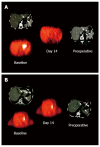Proteomic and metabolic prediction of response to therapy in gastric cancer
- PMID: 25320503
- PMCID: PMC4194549
- DOI: 10.3748/wjg.v20.i38.13648
Proteomic and metabolic prediction of response to therapy in gastric cancer
Abstract
Several new treatment options for gastric cancer have been introduced but the prognosis of patients diagnosed with gastric cancer is still poor. Disease prognosis could be improved for high-risk individuals by implementing earlier screenings. Because many patients are asymptomatic during the early stages of gastric cancer, the diagnosis is often delayed and patients present with unresectable locally advanced or metastatic disease. Cytotoxic treatment has been shown to prolong survival in general, but not all patients are responders. The application of targeted therapies and multimodal treatment has improved prognosis for those with advanced disease. However, these new therapeutic strategies do not uniformly benefit all patients. Predicting whether patients will respond to specific therapies would be of particular value and would allow for stratifying patients for personalized treatment strategies. Metabolic imaging by positron emission tomography was the first technique with the potential to predict the response of esophago-gastric cancer to neoadjuvant therapy. Exploring and validating tissue-based biomarkers are ongoing processes. In this review, we discuss the status of several targeted therapies for gastric cancer, as well as proteomic and metabolic methods for investigating biomarkers for therapy response prediction in gastric cancer.
Keywords: Gastric cancer; Matrix-assisted laser desorption-ionization; Positron emission tomography; Response prediction; Therapy.
Figures



Similar articles
-
Personalized medicine in gastric cancer: Where are we and where are we going?World J Gastroenterol. 2016 Jan 21;22(3):1160-71. doi: 10.3748/wjg.v22.i3.1160. World J Gastroenterol. 2016. PMID: 26811654 Free PMC article. Review.
-
Progress in the development of protein biomarkers of oesophageal and gastric cancers.Proteomics Clin Appl. 2016 Apr;10(4):532-45. doi: 10.1002/prca.201500079. Epub 2016 Jan 5. Proteomics Clin Appl. 2016. PMID: 26582241 Review.
-
Recent updates of precision therapy for gastric cancer: Towards optimal tailored management.World J Gastroenterol. 2016 May 21;22(19):4638-50. doi: 10.3748/wjg.v22.i19.4638. World J Gastroenterol. 2016. PMID: 27217696 Free PMC article. Review.
-
Targeted therapies in metastatic gastric cancer: Current knowledge and future perspectives.World J Gastroenterol. 2019 Oct 14;25(38):5773-5788. doi: 10.3748/wjg.v25.i38.5773. World J Gastroenterol. 2019. PMID: 31636471 Free PMC article. Review.
-
Companion diagnostics for the targeted therapy of gastric cancer.World J Gastroenterol. 2015 Oct 21;21(39):10948-55. doi: 10.3748/wjg.v21.i39.10948. World J Gastroenterol. 2015. PMID: 26494953 Free PMC article. Review.
Cited by
-
Radiomic analysis using contrast-enhanced CT: predict treatment response to pulsed low dose rate radiotherapy in gastric carcinoma with abdominal cavity metastasis.Quant Imaging Med Surg. 2018 May;8(4):410-420. doi: 10.21037/qims.2018.05.01. Quant Imaging Med Surg. 2018. PMID: 29928606 Free PMC article.
-
Research advances in the molecular classification of gastric cancer.Cell Oncol (Dordr). 2024 Oct;47(5):1523-1536. doi: 10.1007/s13402-024-00951-9. Epub 2024 May 8. Cell Oncol (Dordr). 2024. PMID: 38717722 Free PMC article. Review.
-
Light sheet fluorescence microscopy guided MALDI-imaging mass spectrometry of cleared tissue samples.Sci Rep. 2020 Sep 2;10(1):14461. doi: 10.1038/s41598-020-71465-1. Sci Rep. 2020. PMID: 32879402 Free PMC article.
-
Molecular Characterization of Gastric Carcinoma: Therapeutic Implications for Biomarkers and Targets.Biomedicines. 2018 Mar 9;6(1):32. doi: 10.3390/biomedicines6010032. Biomedicines. 2018. PMID: 29522457 Free PMC article. Review.
-
Exosomal non‑coding RNAs: Novel biomarkers with emerging clinical applications in gastric cancer (Review).Mol Med Rep. 2020 Nov;22(5):4091-4100. doi: 10.3892/mmr.2020.11519. Epub 2020 Sep 17. Mol Med Rep. 2020. PMID: 33000279 Free PMC article. Review.
References
-
- Siegel R, Naishadham D, Jemal A. Cancer statistics, 2013. CA Cancer J Clin. 2013;63:11–30. - PubMed
-
- Ferlay J, Shin HR, Bray F, Forman D, Mathers C, Parkin DM. Estimates of worldwide burden of cancer in 2008: GLOBOCAN 2008. Int J Cancer. 2010;127:2893–2917. - PubMed
-
- Lordick F, Lorenzen S, Yamada Y, Ilson D. Optimal chemotherapy for advanced gastric cancer: is there a global consensus? Gastric Cancer. 2014;17:213–225. - PubMed
-
- Ott K, Sendler A, Becker K, Dittler HJ, Helmberger H, Busch R, Kollmannsberger C, Siewert JR, Fink U. Neoadjuvant chemotherapy with cisplatin, 5-FU, and leucovorin (PLF) in locally advanced gastric cancer: a prospective phase II study. Gastric Cancer. 2003;6:159–167. - PubMed
-
- Schuhmacher C, Gretschel S, Lordick F, Reichardt P, Hohenberger W, Eisenberger CF, Haag C, Mauer ME, Hasan B, Welch J, et al. Neoadjuvant chemotherapy compared with surgery alone for locally advanced cancer of the stomach and cardia: European Organisation for Research and Treatment of Cancer randomized trial 40954. J Clin Oncol. 2010;28:5210–5218. - PMC - PubMed
Publication types
MeSH terms
Substances
LinkOut - more resources
Full Text Sources
Other Literature Sources
Medical

